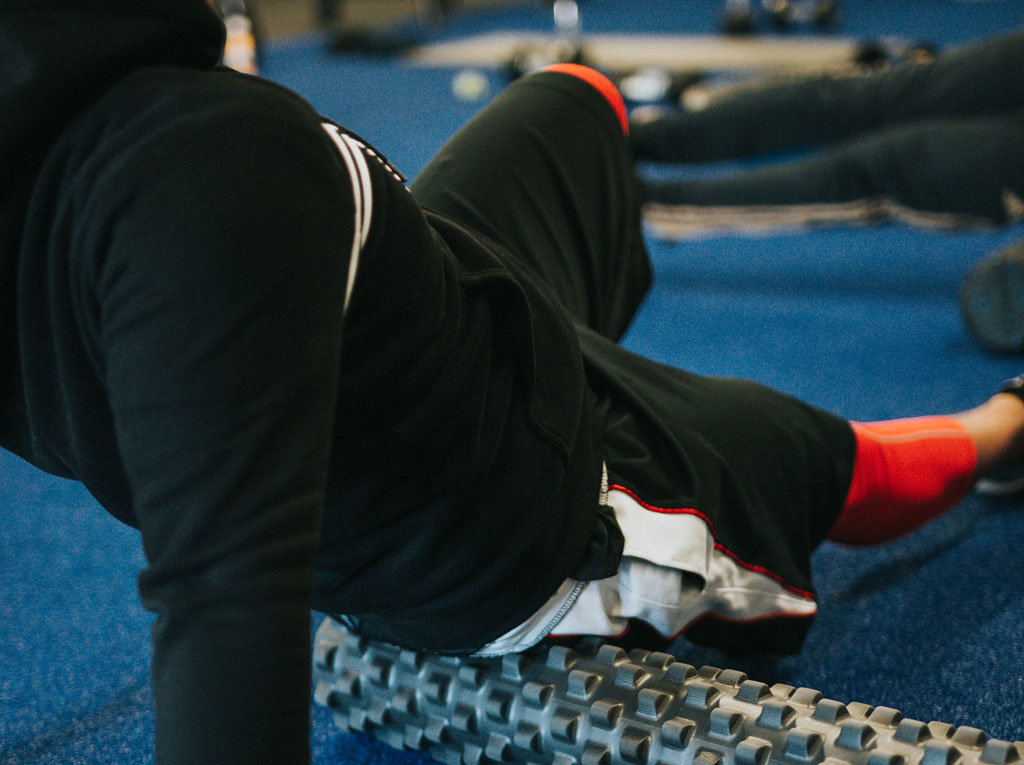If you have hip pain, you are not alone. In fact, 30 to 40 percent of adults who play sports have chronic hip pain, and 12 to 15 percent of everyone over the age of 60 experience pain in their hip joints. The hip is one of the largest weight-bearing joints in the body, and the intricate structure of bones, connective tissue, and muscles make it susceptible to conditions that cause pain and disability.
Injuries and certain conditions, such as arthritis, are likely to cause hip pain that prevents you from working, taking care of your family, or participating in your favorite sports and hobbies. Fortunately, treatment can greatly reduce hip pain and improve your mobility. The best news is that you can treat some types of hip pain at home.
Anatomy of the Hip
Understanding the anatomy of the hip can help you identify the cause of your pain, and determine how to treat it.
The hip is a ball and socket joint that connects the thigh bone and the pelvis. The upper part of the thigh bone has a ball-shaped end that fits into a socket of the pelvis. Bands of ligament tissue connect the ball to the socket to stabilize the hip and form the joint capsule. Inside the joint capsule is the synovium, which is a thin membrane that produces a thick fluid that lubricates the joint. Fluid-filled sacs, known as bursae, cushion the joints to prevent friction between muscles, tendons, and bones.
Large muscles surround the hip, support the joint, and allow you to move your legs. Major nerves and blood vessels also run through the hip. The sciatic nerve passes through the buttocks and down the thigh, for example.
Causes of Hip Pain
Acquiring help for hip pain requires you to first address the underlying cause(s) of this pain. Hip pain may develop as the result of an injury or a medical condition. Here are a few common causes of hip pain:
Arthritis
Arthritis is a condition that causes swelling and tenderness of the joints. There are several types of arthritis affecting the hips including:
- Osteoarthritis. The most common type of arthritis, osteoarthritis develops with wear and tear of the protective cartilage that cushions the ends of the bones.
- Juvenile idiopathic arthritis. Once known as juvenile rheumatoid arthritis, this type of arthritis develops during childhood.
- Psoriatic arthritis. This causes a skin problem known as psoriasis in addition to joint pain.
- Rheumatoid arthritis. This occurs when the immune system mistakenly attacks the joints.
Injuries
Several types of injuries can cause hip pain. Common injuries affecting the hip include:
- Bursitis. Inflammation of the bursae.
- Hip fracture.
- Sprains. Tearing or stretching of the ligaments.
- Tendinitis. Inflammation of the tendons that connect muscles to bones.
- Pinched nerves. Inflamed tissue presses against nerves to cause pain.
- Sciatica. Inflammation of the sciatic nerve.
Medical Conditions
Certain medical conditions can also cause hip pain. These conditions include:
- Bone cancer.
- Osteoporosis. Causes weak and brittle bones.
- Bone infections.
- Synovitis. Occurs with tissue inflammation inside the hip joint capsule.
How to Help Hip Pain at Home
You may be able to treat minor cases of hip pain at home without having to make a trip to the doctor. A home remedy for hip pain may include:
- Resting the hip joint. Avoid repeatedly bending at the hip or applying direct pressure to the joint. Avoid sleeping on the affected side and prolonged sitting.
- Taking over-the-counter pain relievers. These can include acetaminophen, ibuprofen, and naproxen.
- Applying ice or heat. Applying an ice bag or a bag of frozen vegetables wrapped in a towel can help reduce pain. Applying heat can help prepare your muscles for therapeutic stretching exercises.
- Applying compression. Wrap your hip in a compression bandage, ace bandage, or other sports wrap.
- Elevating the affected area.
- Performing gentle stretching exercises. These are effective for arthritic hip pain relief and relieving pain for a strain or a pinched nerve.
When to Seek Medical Care for Hip Pain
Some types of hip pain, especially those caused by an injury, require medical attention. Ask someone to drive you to an emergency department or urgent care clinic if you have injured your hip and are experiencing:
- Inability to move your hip or leg
- A joint that appears deformed
- Severe or sudden pain
- Sudden swelling
- Inability to bear weight on the affected leg
- Fever, chills, redness, or any other signs of infection
You may also need medical attention for hip pain not associated with an injury. If your hip pain lasts longer than two weeks, even with home treatment, schedule an appointment with your doctor. An orthopaedic specialist will know how to alleviate hip pain quickly and easily.
Your medical team may run laboratory and imaging tests to determine the underlying cause of your pain. These lab and imaging tests may include:
- Blood test
- Urine test
- X-rays
- Ultrasound
- CT scan
- MRI
- Joint fluid sample
The specific treatment for hip pain depends largely on its underlying cause. Medical treatment for hip pain may include:
- Using crutches to help you move without stressing the hip joint.
- Physical therapy to reduce hip pain associated with arthritis, strains, tears, and tendinitis.
- Medications to relieve pain, treat arthritis, reduce inflammation, suppress the immune system, or strengthen bones.
- Surgery if severe hip pain has a known cause, such as a broken hip or bone spurs.
- Hip replacement surgery.
For more information about how to treat hip pain, consult with our orthopaedic doctors in CT. Your orthopaedic specialist can determine the underlying cause(s) of hip pain and help you create a hip pain treatment plan that works. Our team of Connecticut orthopaedic doctors has advanced training and expertise in hip joint pain treatment and can provide you with the hip pain solutions you need to get back on your feet.
Valley Orthopaedic Specialists offers the best orthopaedic surgeons in CT and we are always glad to serve you. Hip pain relief is within your reach!

